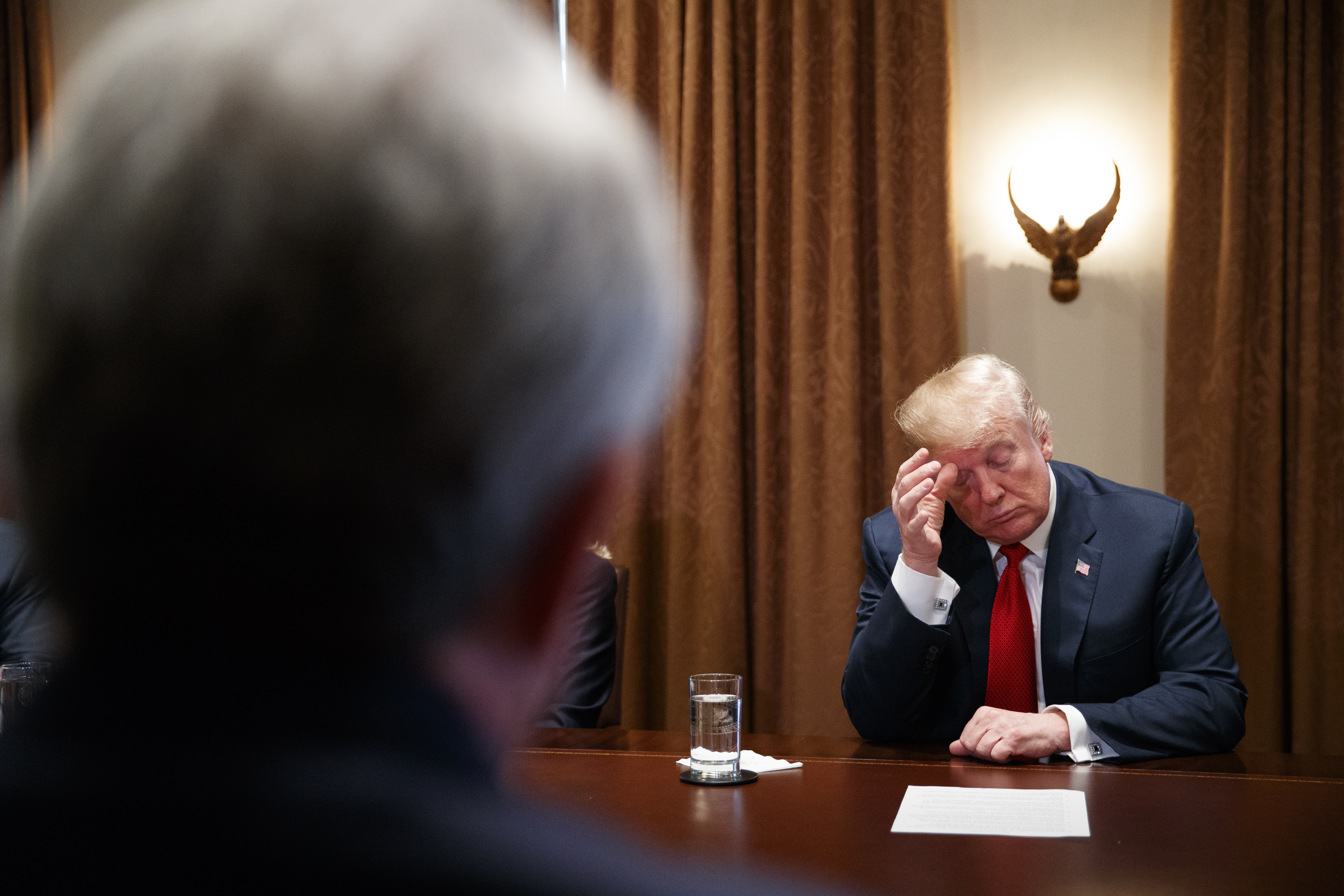Can Trump really refuse to answer Mueller's questions?
Don't bet on it


For months, President Trump's lawyers have been confidently assuring him that Special Counsel Robert Mueller's investigation into Russian involvement in the 2016 election was about to wrap up. It'll be done by Thanksgiving, they promised him. Definitely by the end of 2017. Any day now, it'll be over.
With those predictions came an implicit (or perhaps explicit) reassurance: He's not going after you, sir, you have nothing to worry about. And indeed, the idea that he wasn't personally under investigation has been nothing short of an obsession with Trump. He repeatedly asked former FBI Director James Comey whether he was under investigation, and when he fired Comey last May, he took the time in his brief letter to write, "I greatly appreciate you informing me, on three separate occasions, that I am not under investigation." In July he told The New York Times, "I'm not under investigation. For what? I didn't do anything wrong." In November he told the paper, "I'm not under investigation, as you know." "Everybody tells me I'm not under investigation," he said last month. "Maybe Hillary is, I don't know, but I'm not."
Spoken like a man who's awfully afraid that should someone investigate him, they might find some interesting things. And there's so much there to examine, particularly his long history of dealings with shady characters whose names just happen to end in the letter V. As Trump's lawyers try desperately to shield him from Mueller, no prospect is more horrifying than Mueller and his team sitting down to ask the president questions. Specific questions, with follow-ups.
The Week
Escape your echo chamber. Get the facts behind the news, plus analysis from multiple perspectives.

Sign up for The Week's Free Newsletters
From our morning news briefing to a weekly Good News Newsletter, get the best of The Week delivered directly to your inbox.
From our morning news briefing to a weekly Good News Newsletter, get the best of The Week delivered directly to your inbox.
Though Trump has said publicly that he'd welcome the opportunity to sit down with Mueller, the Times reports that his lawyers are advising him against agreeing to such an interview, because they "are concerned that the president, who has a history of making false statements and contradicting himself, could be charged with lying to investigators."
Wise counsel there, Matlock.
An interview with Mueller is obviously a minefield, particularly since these days just about the only person who's allowed to ask Trump multiple questions at a time is Sean Hannity. Mueller is a serious prosecutor who by all accounts has been pursuing his investigation diligently. You can be sure that he has a great many things he'd like to ask the president, and he's unlikely to be fooled by Trump's attempts at evasion.
We also know that for all his success as a performer, Trump doesn't do particularly well in depositions. In 2007, lawyers deposed him in a lawsuit he filed against a journalist who wrote that Trump had inflated his wealth. In the deposition, they forced him 30 separate times to admit that he had lied about something (he lost the case). In 2016, his deposition in the Trump University lawsuit featured an ironic highlight, in which Trump said he couldn't recall so many events and statements that the plaintiff's lawyer finally asked him whether he had claimed to have the world's greatest memory. Though Trump had in fact said that just weeks before, he said he couldn't recall saying it. He lost that case, too, by agreeing to pay $25 million to the victims of his scam.
A free daily email with the biggest news stories of the day – and the best features from TheWeek.com
Some of Trump's allies worry that any interview with Mueller would be a setup. "Don't do it," Rush Limbaugh advised. "It's just a perjury trap." Trump buddy and longtime dirty trickster Roger Stone warned that Mueller is setting "an obvious perjury trap." But here's the thing about a perjury trap: You can't fall into it unless you're willing to commit perjury.
That's hardly the only potential danger. Mueller may want to establish the "corrupt intent" necessary to prove obstruction of justice. While it might not produce a moment out of A Few Good Men, it wouldn't be hard to imagine Trump damning himself with his own words on that subject.
So what we have here is a conflict between Trump's lawyers' well-founded fears that their client will destroy himself as soon as he submits to questions, and Trump's own hubris in believing (as he surely does) that he's such a very stable genius that he could emerge triumphant from any interrogation. But let's say they convince him not to submit to Mueller's questions. What happens then?
The answer is that Mueller could issue a subpoena for Trump to appear before the grand jury, and as precedent has established, even presidents have to obey subpoenas. That's what happened in 1998: After negotiations over how Bill Clinton would answer independent counsel Kenneth Starr's questions dragged on, Starr eventually issued a grand jury subpoena ordering Clinton to appear. With that prospect concentrating his attention, Clinton agreed to an arrangement under which he would be deposed in the White House with his lawyers present.
If Trump refuses to allow Mueller to interview him, a subpoena is Mueller's next option. Given Trump's contempt for people telling him what to do, I wouldn't be surprised if Trump simply refuses to obey it. It would eventually be up to the Supreme Court to decide whether the law applies even to Republican presidents, and though their record on such matters is less than stellar, in this case it seems unlikely they'd issue Trump a "Get out of jail free" card.
So we may get to see Trump squirm after all, as he's presented with damning evidence and forced to answer for his lies and (possible) misdeeds. It should be fascinating to watch.
Paul Waldman is a senior writer with The American Prospect magazine and a blogger for The Washington Post. His writing has appeared in dozens of newspapers, magazines, and web sites, and he is the author or co-author of four books on media and politics.
-
 Wilde Cambridge: home-away-from-home in a prime city spot
Wilde Cambridge: home-away-from-home in a prime city spotThe Week Recommends This laid-back aparthotel is the perfect base for a weekend of exploring
-
 The best alcohol-free alternatives for Dry January
The best alcohol-free alternatives for Dry JanuaryThe Week Recommends Whether emerging from a boozy Christmas, or seeking a change in 2026, here are some of the best non-alcoholic beers, wines and spirits to enjoy
-
 A lemon-shaped exoplanet is squeezing what we know about planet formation
A lemon-shaped exoplanet is squeezing what we know about planet formationUnder the radar It may be made from a former star
-
 Bari Weiss’ ‘60 Minutes’ scandal is about more than one report
Bari Weiss’ ‘60 Minutes’ scandal is about more than one reportIN THE SPOTLIGHT By blocking an approved segment on a controversial prison holding US deportees in El Salvador, the editor-in-chief of CBS News has become the main story
-
 Has Zohran Mamdani shown the Democrats how to win again?
Has Zohran Mamdani shown the Democrats how to win again?Today’s Big Question New York City mayoral election touted as victory for left-wing populists but moderate centrist wins elsewhere present more complex path for Democratic Party
-
 Millions turn out for anti-Trump ‘No Kings’ rallies
Millions turn out for anti-Trump ‘No Kings’ ralliesSpeed Read An estimated 7 million people participated, 2 million more than at the first ‘No Kings’ protest in June
-
 Ghislaine Maxwell: angling for a Trump pardon
Ghislaine Maxwell: angling for a Trump pardonTalking Point Convicted sex trafficker's testimony could shed new light on president's links to Jeffrey Epstein
-
 The last words and final moments of 40 presidents
The last words and final moments of 40 presidentsThe Explainer Some are eloquent quotes worthy of the holders of the highest office in the nation, and others... aren't
-
 The JFK files: the truth at last?
The JFK files: the truth at last?In The Spotlight More than 64,000 previously classified documents relating the 1963 assassination of John F. Kennedy have been released by the Trump administration
-
 'Seriously, not literally': how should the world take Donald Trump?
'Seriously, not literally': how should the world take Donald Trump?Today's big question White House rhetoric and reality look likely to become increasingly blurred
-
 Will Trump's 'madman' strategy pay off?
Will Trump's 'madman' strategy pay off?Today's Big Question Incoming US president likes to seem unpredictable but, this time round, world leaders could be wise to his playbook
